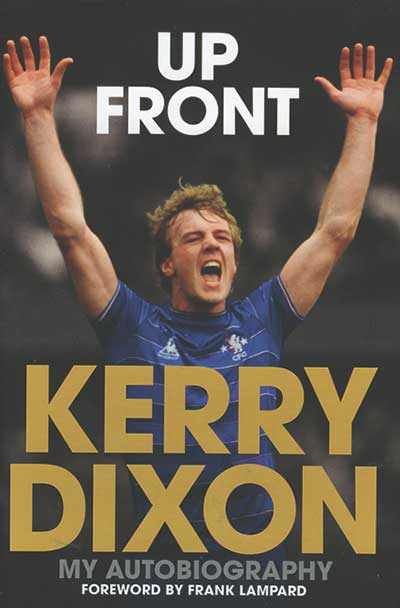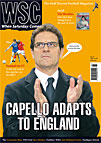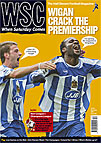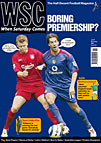
with Harry Harris
John Blake, £17.99
Reviewed by Mike Ticher
From WSC 359, January 2017
Buy this book

with Harry Harris
John Blake, £17.99
Reviewed by Mike Ticher
From WSC 359, January 2017
Buy this book
 David Stubbs looks at the tabloids’ unique style of football reporting
David Stubbs looks at the tabloids’ unique style of football reportingIn Chris Horrie and Peter Chippindale’s Stick It Up Your Punter!, their study of the Sun during the 1980s editorship of Kelvin MacKenzie, the authors recount a journalists’ strike during which sub-editors had to write up the football match reports. Wizened old cynics that they were, they decided to turn the task into an exercise of which of them could come up with the most meaningless cliche with which to pad out their copy. The winner was “kick and rush glory boys”.
As with tabloid coverage across the board, their headlines, straplines and copy have, over the past quarter of a century, generated a tag cloud of grab-bag buzz-words – “blast”, “probe”, “lions”, “tragedy”, “flops”, “fury”, “blast”, “swoop”, “sensational”, “glory”, “shame”, “thugs”, “heroes”, and so forth. Not a great deal has changed in
this respect.
Some have fallen by the way with time. Gary Lineker was habitually described as “hot-shot” back in his mid-1980s pomp, a mode of description which eventually died of hackneyed shame. Even “skipper” seems in danger of extinction.
All of these words have one thing in common. Like the word “pesky”, which was only ever uttered by the likes of Little Plum in the Beano, they are at once deadeningly familiar and yet unspoken by actual people in real life, least of all tabloid readers. A particular example of this is “shaker”, used not to allude to a member of The United Society of Believers in Christ’s Second Appearing, but to convey in six letters an injury scare.
These devices also function to contrast with the inconsequential reality of the football world on a day-to-day basis, as well as the warily, dully discreet equivocations favoured by players and managers when talking to journalists. Much as on Football Focus they’re forced to jazz up a teeth-grindingly tedious interview with a Scott Parker by switching in and out of grainy black and white or zooming in on his hands, so these words add a falsely incendiary gloss.
So, in October 1986, we read in the Daily Mirror that Tony Adams was Gunning For Kerry Dixon on the eve of an Arsenal v Chelsea fixture. Here are the fighting words from Adams whose psychologically warfaring mood that headline captures: “All First Division strikers need careful watching and facing Kerry will be another good test for me.”
Look for sensationalist cliche and you would assume the first port of call to be the Sun. It’s certainly had its moments of crass extremism, such as Argies Get Their Revenge, following England’s World Cup exit to the Hand of God goal in 1986, or the pillorying of Messrs Robson and Taylor. However, it’s almost disappointing to find, on closer inspection, that their coverage throughout the 1980s and 90s was restrained by the standards of the rest of the paper.
So, when flicking through its 1980s pages, with those abysmal Franklin cartoons, red-baiting and headlines like Rape: Why Men Are Hidden Victims, there is also relatively considered prose from the likes of Martin Samuel. Nothing masterly, mind, still tabloidese, with every paragraph beginning with the words “And” or “But”. Yet by no means as addled or moronic as you might fear. Even in 1996, though the coverage of England’s semi-final against Germany is depressingly festooned in flags of St George, there is virtually no “Kraut” bashing.
That, infamously, could not be said for the Mirror under Piers Morgan’s editorship. It was prior to England v Germany that he produced the mock-up cover of Stuart Pearce and Gazza in tin helmets and the Achtung! Surrender headline, a stunt which he recently described as prompting a “massive sense of humour failure” on the part of his detractors. It turns out he unapologetically regards the cover as a sense of humour success.
This wasn’t a one-off. From the mid-1980s onwards, the Mirror was more startlingly prone to martial imagery than its Wapping counterpart, real Orwellian “war minus the shooting” stuff, tastelessly so a time when hooligan firms were squaring up to each other for real – indeed, you could read all about these “thugs” and their “nights of shame” on the aghast Mirror back pages.
The word “killer” is deployed frequently and airily on its back pages, Leeds manager Billy Bremner is “blitz Billy”, Paul and Clive Allen, up against each other for QPR and Spurs, are a “family at war”. Man Utd are “shell-shocked” to be beaten 1-0 at Wimbledon, while a 15,000-strong fans’ petition to regain the their ground and presence at a club meeting goes under the headline VALLEY WAR. The gruesome, bloody details follow – police were called as directors Derek Ufton and Michael Norris “reeled under a barrage of questions”.
Then, of course, there are those trenches, from which the likes of Crystal Palace are forever charging “with bayonets fixed”, in which burly, yeomen English defenders line up side by side, in which the real nitty-gritty business of football is conducted, and to which the foreign influx would probably be averse. In the Daily Express, in 1992, James Lawton worried about how “battle hardened” Eric Cantona, then of Leeds, would prove in the impending Premier League season, in a piece titled Dainty Eric Must Face Up To Trench Warfare.
If foreigners weren’t conspicuous in tabloid-land decades ago, black footballers certainly were. If you hadn’t noticed in the 1980s that John Barnes, for instance, was black, then the tabloids were on hand with constant reminders. He was, in 1988, our “brightest black pearl”, or, according to Emlyn Hughes, the “best black player ever produced in this country”, an important distinction. In 1986, Steve Curry in the Express felt obliged to describe the “happy Calypso manner” in which Barnes told him he would be prepared to play anywhere for England.
However, when Barnes, Ricky Hill and Brian Stein flew unannounced to Jamaica to take part in a fundraising match there was Fury At Missing Black Aces in the Mirror. Much has remained constant in tabloid coverage. Though Wayne Rooney’s rise has prompted a depressing increase in the penchant for dreadful name-based puns, the England team still vacillate between “lionhearts” and “flops”, as opposed to the routinely, chronically middling mediocrities that they are. But some things at least have changed for the better.
From WSC 295 September 2011
 Ken Monkou was one of the first in a flood of Dutch players to move to Britain. Thomas Blom charts the career of one of football's unsung stars
Ken Monkou was one of the first in a flood of Dutch players to move to Britain. Thomas Blom charts the career of one of football's unsung stars
You may as well blame the Dutch for England failing to qualify for the European Championship finals. No fewer than 158 Dutchmen have come over to supplant local players since English clubs were permitted to sign foreigners in 1978. After George Boateng, the humble, uncapped Ken Monkou is the Dutchman who has made the most top-flight appearances (280 in total). Monkou joined Chelsea in 1989 and played 94 League games (two in Division Two) before moving on to Southampton. He was named player of the year by his club’s supporters no fewer than five times over the course of his career – twice at Chelsea and three times at Southampton – so it’s no wonder he likes life in England and has stayed put. From his base in Harrogate in the Yorkshire Dales (All Creatures Great and Small was always his favourite TV show), he keeps a distant eye on his recently purchased pancake restaurant in the Dutch town of Delft.

Dear WSC
Speaking of bleeping out certain phrases from football commentary and punditry (WSC 225), my pet peeve is “The shot beat the keeper but went wide”. It only beats the keeper if it goes past him and into the goal (or goes past him and is cleared off the line by a team-mate, or goes past him and sticks in the mud and stops, as in a Danny Baker football video). The keeper is only beaten when the ball goes past him within the area of the goal he is there to defend, otherwise any shot that ends up on the roof of the stand or hits the corner flag could be said to have beaten the keeper. Bah!
Phil Brown, Romford
 The derby between Luton and Watford has not been of national significance for a long time, but that hasn’t diminished its intensity. Neil Rose reports on a fixture so highly charged that the clubs will happily give up TV money in a bid for some peace
The derby between Luton and Watford has not been of national significance for a long time, but that hasn’t diminished its intensity. Neil Rose reports on a fixture so highly charged that the clubs will happily give up TV money in a bid for some peace
The very idea of the “M1 derby” may seem risible to outsiders, but for Luton Town and Watford, their clashes are anything but a laughing matter. So much so, in fact, that Luton have turned down a much needed £60,000 on offer from Sky to televise the first league meeting of the pair in eight seasons.